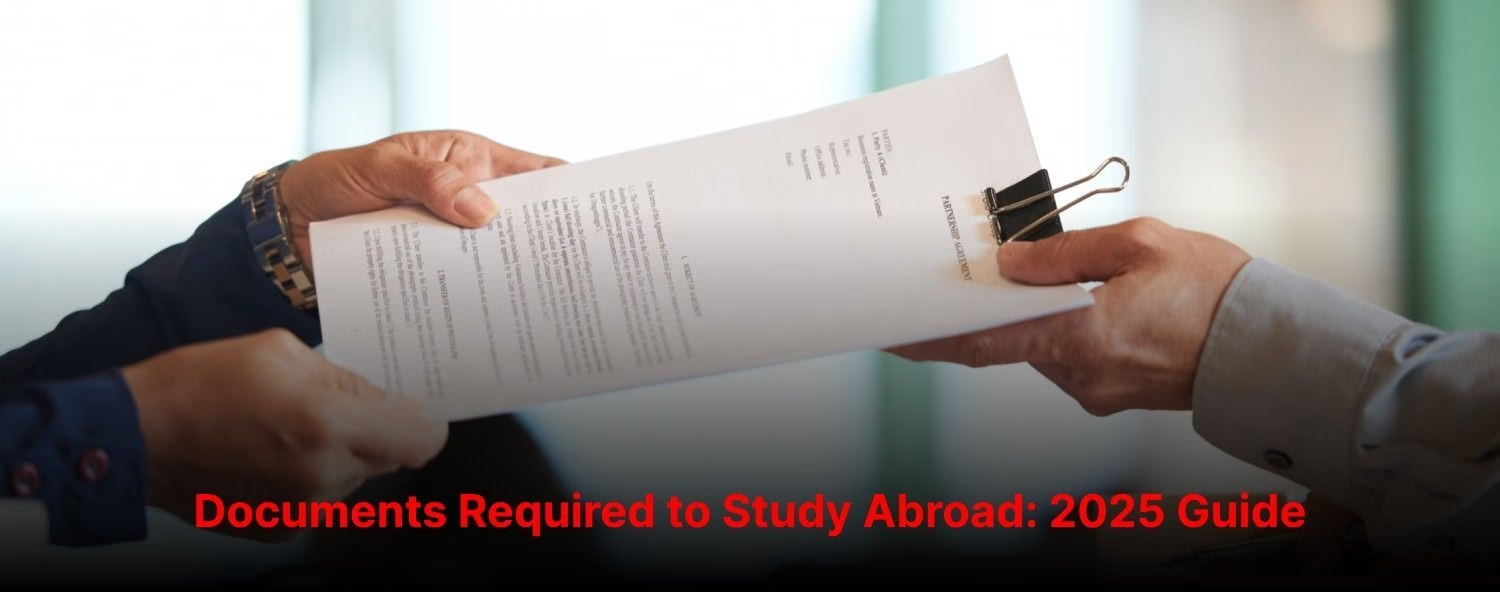
Documents Required to Study Abroad: 2025 Checklist for Indian Students and Abroad Education Consultants in Chennai
Preparing to study abroad can be complex, especially with changing requirements for 2025. Universities and immigration authorities now expect applicants to be thorough and accurate with every study abroad document submitted. Forgotten paperwork or overlooked updates can lead to costly delays or missed opportunities.
A precise checklist of documents required to study abroad is now more important than ever. From passports and academic transcripts to updated financial proofs and English test scores, each piece is critical. Staying updated on documents required for study abroad helps both students and abroad education consultants in Chennai prevent common application mistakes.
This guide gives a clear overview of the documents needed to study abroad for 2025. It features updates that reflect new international student policies and includes best practices recommended by leading study abroad process essentials. Whether you’re an applicant or work with an abroad consultancy in Chennai, having the right paperwork in order sets the stage for a smooth process.
Essential Academic Documents for Study Abroad
Submitting the correct academic documents is a non-negotiable step in any study abroad journey. Universities and immigration officers ask for proof of your past education, scores, and language skills before moving forward with your application. Incomplete files or missing reports can slow down admissions or even result in rejection. Below is a detailed guide to the academic documents required for abroad study. Keep this checklist handy for a smooth 2025 application process.
Transcripts and Marksheets
form the backbone of any study abroad application. Most universities ask for detailed, official transcripts that show each subject studied, the grades or marks earned, and the total credits completed.
- Request transcripts directly from your school or college to meet university rules.
- Marksheets, which list scores for every semester or year, may also be needed as supporting proof.
Many institutions want these documents to be stamped and sealed. They may also require notarized English translations, especially if your original records aren’t in English. Before applying, check if scans or original hard copies are needed.
Degree Certificates and Provisional Certificates
A final degree certificate confirms that you finished your previous education, whether undergraduate or postgraduate. If you are still waiting for your final certificate, a provisional certificate serves as valid, temporary proof of graduation for most universities.
Key facts about degree certificates required for abroad study:
- Your certificate must have your name, degree, college, and the awarding body.
- If you haven’t received the original certificate, request a provisional one from your university right away.
Understand how a provisional certificate works and its limitations by reading this detailed resource on provisional degree certificates. While most universities accept provisional certificates for initial admissions, they usually set a deadline to submit the final document.
Standardized Test Scores (IELTS, TOEFL, GRE, GMAT)
Many study abroad destinations require standardized test scores to evaluate your academic and language skills, especially for English-speaking countries.
The most common test scores demanded by universities and visa officials are:
- IELTS or TOEFL: Assess English language proficiency.
- GRE or GMAT: Required for admission to graduate programs in business or technical fields.
Send your official score reports directly from the test agency to each institution, as many do not accept self-attested copies. Keep digital and paper records handy, as some embassies may also request these during visa processing.
Language Proficiency Certificates: Highlight the Need for IELTS and Training
Clear proof of English language skills is mandatory for most study abroad programs. The International English Language Testing System (IELTS) is often at the top of the list. High IELTS scores not only meet university requirements but also boost visa approval chances.
- Many universities in the US, UK, Canada, and Australia have a minimum IELTS band score for each skill area.
- Dedicated IELTS training in Chennai helps applicants build the right skills and confidence for a good result.
Abroad education consultants in Chennai usually guide students on which language test fits their goals. They may recommend prep classes, mock tests, and practice materials tailored to individual needs.
Preparing for the IELTS in advance also prevents last-minute stress and increases your file’s strength compared to other applicants. For comprehensive training and expert strategies, get support from local specialists who know the requirements inside out.

Identity, Financial, and Visa Documentation
Every study abroad journey requires a solid set of documents to prove your identity, finances, and visa eligibility. Each document plays a specific role in convincing universities and immigration authorities of your readiness and legal compliance. For students applying in 2025, having updated versions of these documents is critical, as even a small error can slow down the process or jeopardize admissions. A comprehensive overview of the key identity, financial, and visa documents required for studying abroad.
Valid Passport and Passport Photos
A valid passport stands at the top of any list of documents required to study abroad. Your passport is your main form of identification abroad and should remain valid for at least six months after your intended study duration.Renewal processes can take several weeks, so start early if your passport is near expiration.
Universities and immigration officials will also require recent passport-sized photos for forms, ID cards, and your visa application. Always use photos that match international requirements—plain background, no headwear (unless for religious reasons), and proper facial expression.
Keep several digital and hard copies. If you need help preparing, both abroad education consultants in Chennai and abroad consultancy in Chennai often review these details for you.
Financial Proofs and Bank Stateme

Photo by Mikhail Nilov
Proof of funds is one of the documents needed to study abroad that directly affects your visa approval. Authorities want to see that you (or your family) can cover tuition fees, living expenses, and travel costs.
Here’s what you typically need:
- Recent original bank statements (usually last 6–12 months).
- Fixed deposit certificates or bond statements.
- Proof of scholarship or grant, if any.
Documents should be printed on official bank letterhead, with a stamp and date included.
Some countries, such as the UK and Canada, list minimum fund requirements on their immigration websites. Incomplete financial records are a major cause of delayed or rejected applications, so double-check every statement for accuracy. More guidance is often available from education consultants who track these evolving requirements.
Sponsorship Letters and Affidavits of Support
If your study abroad expenses are being paid by a parent or another sponsor, sponsorship letters and affidavits of support are essential. These legal documents verify who will bear your costs and confirm their financial ability.
Key points include:
- Official relationship proof (like a birth certificate if a parent sponsors you).
- Signed affidavit or sponsorship letter, stating intent to finance studies.
- Supporting bank statements or income proof provided by the financial sponsor.
These affidavits must be notarized and often include details about the sponsor’s occupation, annual income, and banking history. Drafting errors can lead to delays, so consult local experts or template resources provided by seasoned study abroad consultants in Chennai.
Student Visa Documents
Your student visa application is only as strong as the paperwork you present. Immigration officers scrutinize every document submitted, so a full, organized, and current set is critical.
Your student visa file should include:
- Offer letter or admission confirmation from your university.
- Documents demonstrating enough financial support to cover your entire stay.
- Filled visa application forms along with proof of fee payment.
- Medical check-up reports or police clearance (as applicable by destination country).
For technical requirements specific to each country, such as biometrics, digital photos, or extra forms, partner with a trusted Chennai Student Visa Consultant. Their expertise saves time and prevents common mistakes, making the process smoother. These specialists in student visa help in Chennai can also update you about any new rules for 2025.
Each document in this section is a building block that keeps your application strong and ready for scrutiny. Maintain organized digital and paper copies to help avoid setbacks, and tap into the best local guidance from Chennai’s education consultants. For a deeper look at the application process and how to avoid common pitfalls, see the Common Mistakes in Late College Applications guide
Supporting Documents for Applications
A strong application for studying abroad requires more than just grades and financial proof. Additional supporting documents may be requested by universities and visa officials. These papers provide a clear view of your goals, experiences, and potential. Carefully consider the information each document conveys. Below, we explain three core documents required to study abroad: the Statement of Purpose, Letters of Recommendation, and your Resume or CV.

Photo by George Pak
Statement of Purpose (SOP) and Essay Requirements
The Statement of Purpose (SOP) serves as your personal introduction or pitch to the university. It details why you want to study abroad, your career goals, and why you chose a specific college or course. Each university may have different essay prompts, but they want the same thing—clarity and honesty about your plans.
Keep your SOP and essays focused:
- State your academic background and explain your program choice.
- Connect your achievements to your future goals.
- Mention how the course fits your plans for growth.
- Address any academic gaps or irregular results.
Most universities will also want you to outline how you plan to use your education after graduation. Use clear sentences and avoid exaggerations. Double-check word limits and formatting rules. For the best result, have your SOP reviewed by a mentor or an experienced advisor at an abroad consultancy in Chennai.
Letters of Recommendation
Letters of Recommendation (LORs) provide clear insight into your skills, character, and accomplishments. Most universities ask for 2-3, written by former teachers, professors, or employers. Their honest feedback supports your application by adding context to your transcripts.
Key aspects universities look for in LORs:
- Professional relationship (teacher, mentor, boss)
- Specific achievements or projects with clear examples
- Remarks about your professionalism, leadership qualities, and abilities.
Always choose recommenders who know your work well. Give them enough time and the right guidelines to avoid generic or vague letters. Well-written letters make your profile stronger. To understand why LORs matter, see the Advantages of Studying Abroad and how strong recommendations open doors to unique opportunities.
Resume or Curriculum Vitae (CV)
A Resume or Curriculum Vitae (CV) outlines your educational background, work experience, and accomplishments. For study abroad applications, your CV is more than a job application; it is a record of all relevant accomplishments.
Your CV should include:
- Personal details (name, contact, date of birth)
- Academic records with marks and degrees
- Details of any work experience or internships
- Awards, extra-curricular activities, and special skills
Keep formatting simple. Use bullet points instead of lengthy paragraphs to highlight key details clearly. Customize your resume to showcase aspects relevant to the course you’re applying for. Universities appreciate presentations that are clear, precise, and directly related.
With these supporting documents, your study abroad application tells a complete story. Preparing these files carefully can help set you apart and shows you are ready for the challenges ahead.
Health, Travel, and Accommodation Documents
Organizing your health, travel, and housing documents is an essential step in getting ready to study abroad. Authorities in your destination country need to know you have the right vaccinations, that your health is protected, and that your living situation is set up before you land. These requirements are not just procedural—they protect you and others, and they prove your readiness for international life. Here is what you should prepare and why each record matters.
Medical and Immunization Records
Carrying up-to-date medical and immunization records is now standard for most students studying abroad. Governments and universities check these documents to prevent the spread of infectious diseases and ensure a safe environment on campus.
- Collect official proof of all vaccinations and boosters required by your destination. Many countries require the International Certificate of Vaccination (the “yellow card”) stamped by an authorized clinic.
- Medical records should also include recent check-up results and specific reports if you have ongoing health conditions.
- Keep digital copies in addition to paper forms. Certain universities require you to upload these documents directly during the registration process.
Different countries have specific vaccination requirements. Review updates on Travelers’ Health for Studying Abroad and medical forms for accuracy. If you have any missing doses, schedule an appointment before your departure. Detailed guidance is also available from your abroad consultancy in Chennai.
Health and Travel Insurance
Most countries require international students to have health and travel insurance. Unexpected illnesses or accidents can result in huge expenses, and local health systems do not always cover foreigners.
- Select a student health insurance policy that is accepted by your university and local immigration authority.
- Confirm your insurance covers hospitalization, outpatient treatment, emergency care, and repatriation.
- Carry a digital copy of your policy and emergency contact details for your insurer.
To find up-to-date insurance plans and compare options, explore International Student Insurance and verify the requirements with your university. Most abroad education consultants in Chennai recommend buying insurance before you leave India, not on arrival.
Accommodation Proofs and Arrival Documents
You must give clear evidence of your housing arrangements before your visa interview and when you enter your destination country. This is proof that you have a safe place to stay and understand where you are going from the airport.
- Provide a valid housing contract, hostel booking confirmation, or rental lease agreement.
- The document should include your full address, landlord or hostel contact, start and end dates, and your full name as it appears on your passport.
- Store both digital and printed copies in your travel folder.
- Immigration officers can request this at the border.
- Some universities provide arrival instructions, airport pickup notices, or special check-in documents—print these as well.
When preparing your travel folder, include copies of your admission letter, arrival checklist, and university contact details. A pre-arrival checklist for international students is useful for last-minute confirmations and helps avoid overlooked requirements. Consulting with local abroad education consultants ensures you cover all details as required for 2025.
Photo by Leeloo The First
Checklist for 2025: Key Updates and Final Steps

Photo by Viridiana Rivera
With 2025 nearing, updated policies and requirements are impacting every stage of the process for Indian students planning to study abroad. Small changes in document formats, deadlines, or extra verifications can make a big difference. This updated checklist helps clarify what documents required to study abroad now look like for the upcoming intake. Using a methodical list keeps your paperwork organized and minimizes the risk of missed details. Relying on advice from seasoned abroad education consultants in Chennai and reviewing the latest process essentials ensures your application is robust and ready for review.
2025 Updates for Abroad Study Documentation
Recent updates focus on security, authenticity, and digital processing. Changes for 2025 include:
- More digital submissions: Many universities ask for scans or uploads instead of hard copies. Official portals may use online verification for transcripts or test scores, speeding up review but requiring strict file naming and format guidelines.
- Stricter identity checks: Greater emphasis on passport validity, biometric data, and updated photographs that meet international rules. Some embassies now need biometric appointment confirmations as part of your visa packet.
- Enhanced financial scrutiny: Authorities check the origin of funds and demand up-to-date bank statements with clear transaction histories. Scholarship proof, if any, should be recent and official.
- Early medical requirements: Health checks and immunization updates must be completed and certified well before departure. Delays in medical clearance can hold up visas or university enrollment.
- Firmer deadlines: Many schools and embassies enforce non-negotiable cutoffs for test scores, financial proofs, and health records. Missing these dates often means deferral to the next intake.
Regularly review trusted resources like Documents Required For Study Abroad In 2025 for global context and check your target university’s official site for program-specific needs. Each destination has its nuances, so double-check with your consultant in Chennai for local tweaks to the documentation checklist.
The Critical Final Steps Before Submission
To avoid errors in your study abroad documents, plan a final review before submission. Build this final step into your calendar—it’s one of the best ways to prevent setbacks. Consider the following:
- Gather originals and certified copies. Every required paper—from transcripts to IELTS results—should be present in both digital and hard-copy forms if asked. Confirm each item is up-to-date and matches university and visa requirements.
- Create a dedicated “2025” folder. Sort scanned documents by type: academic, financial, identity, health, supporting. Use clear, consistent naming. This eases upload stress and makes checks faster during application windows.
- Checklist cross-verification. Run through official checklists from both your university and country of destination. Cross-check each requirement with your files. Flag missing or outdated items for quick updating.
- Consult with a professional. Meet with your abroad education consultant in Chennai for a file review. These experts follow study abroad process essentials and help spot weak points or missing papers that could delay your offer or visa.
- Final document quality check. Check all documents for clear content, readable format, and accurate translations. Unclear scans or improperly translated certificates can be reasons for rejection.
- Verify readiness for the visa interview. Assemble any documents specifically needed for your 2025 student visa meeting, such as biometric confirmations or updated relationship proofs for sponsors. Useful lists like Key Documents for Your 2025 U.S. Student Visa Interview can provide country-specific detail.
- Record your submission. Keep digital receipts, screen captures of uploads, email confirmations from universities and embassy websites. These serve as proof in case of technical issues or for reference during your move abroad.
A methodical approach ensures you meet every rule for 2025. This final audit reduces risk and improves acceptance rates—one missed document can mean lost time and opportunity. Lean on local expertise and current guides to boost your odds of a smooth, successful study abroad application. For more on building a strong foundation, review study abroad process essentials, which include tips straight from experienced consultants and former international students.
Conclusion
A precise approach to study abroad documents is the best way to handle the rising demands for 2025. Each step—gathering academic transcripts, securing financial proofs, and finalizing travel records—strengthens your application and prevents avoidable setbacks. When you keep a detailed checklist and prepare digital copies, you cut the risk of delays and missed chances.
The right documents required to study abroad can make your move abroad smooth, with fewer last-minute obstacles. Partnering with reliable abroad education consultants in Chennai gives you an edge, especially with new policy changes and strict timelines.
Keep your focus on accuracy, stay updated on requirements, and let specialists guide your documentation. For more about the standards and support available, explore the About IMIMS page.
Taking the extra care now opens doors to universities, scholarships, and a strong start to your studies in 2025. Thank you for reading—use this checklist and share your experience to help others preparing for their own journey abroad.Acess
